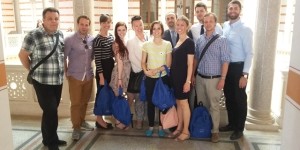A group of senior journalists from various EU Member States made a two-day visit to Bosnia and Herzegovina on 28 and 29 May 2015 to meet institutional officials, members of civil society and to see the results of projects funded by EU taxpayers. The journalists also familiarised themselves with the reforms being undertaken in the context of the country’s EU perspective, in the EU’s recent initiative that re-sequenced of the country’s accession path.
They were received by the Deputy Chairman of the BiH Council of Ministers and BiH Minister of Foreign Trade and Economic Relations, Mr Mirko Sarovic, and senior officials of the Presidency of BiH and the Prime Minister’s Office of the Federation of Bosnia and Herzegovina. Projects visited included the Vijecnica (Sarajevo City Hall), reconstructed with EU assistance, and the Sarajevo Cantonal and Municipal Court building, also rehabilitated with EU assistance. There they met with the Presidents of the two courts and the President of the Higher Judicial and Prosecutorial Council and discussed efforts to increase the efficiency of the judicial system.
In a briefing, the Head of EU Delegation to Bosnia and Herzegovina and EU Special Representative, Ambassador Lars-Gunnar Wigemark, underlined that the EU new initiative focuses on economic and social reforms and other items such as the rule of law, all in line with the EU acquis. He expressed his hope that the initiative will help Bosnia and Herzegovina to move forward and would help citizens to obtain better living standards at the same time. He also stressed the importance of forming an initial reform agenda in the next weeks, that could lead to BiH putting in a credible application for EU membership.
In view of the Stabilisation and Association coming into full force on June 1 2015, Ambassador Wigemark said that it would deepen the relationship between BiH and the EU economically, institutionally and politically, also opening an intense period of bringing standards closer together.
The visit was organised by the European Commission’s Directorate General for European Neighbourhood Policy and Enlargement Negotiations (DG NEAR) as a part of a larger scale programme to raise awareness of enlargement policy in Member States. During their visit, the journalists also met with members of civil society dealing with economic and social issues and freedom of expression. They also had the opportunity to meet local media counterparts at a reception. The group included correspondents from Die Zeit, La Repubblica, France Inter, Kathimerini, Dagens Nyheter, Politiken, Der Standard, Hospodarske Novini, Journal de Noticias, La Vanguardia, PAP, SKAI, Radio 24, Le Quotidien and EFE.

